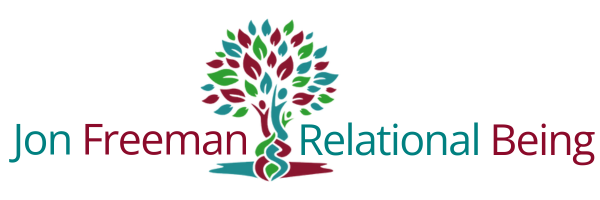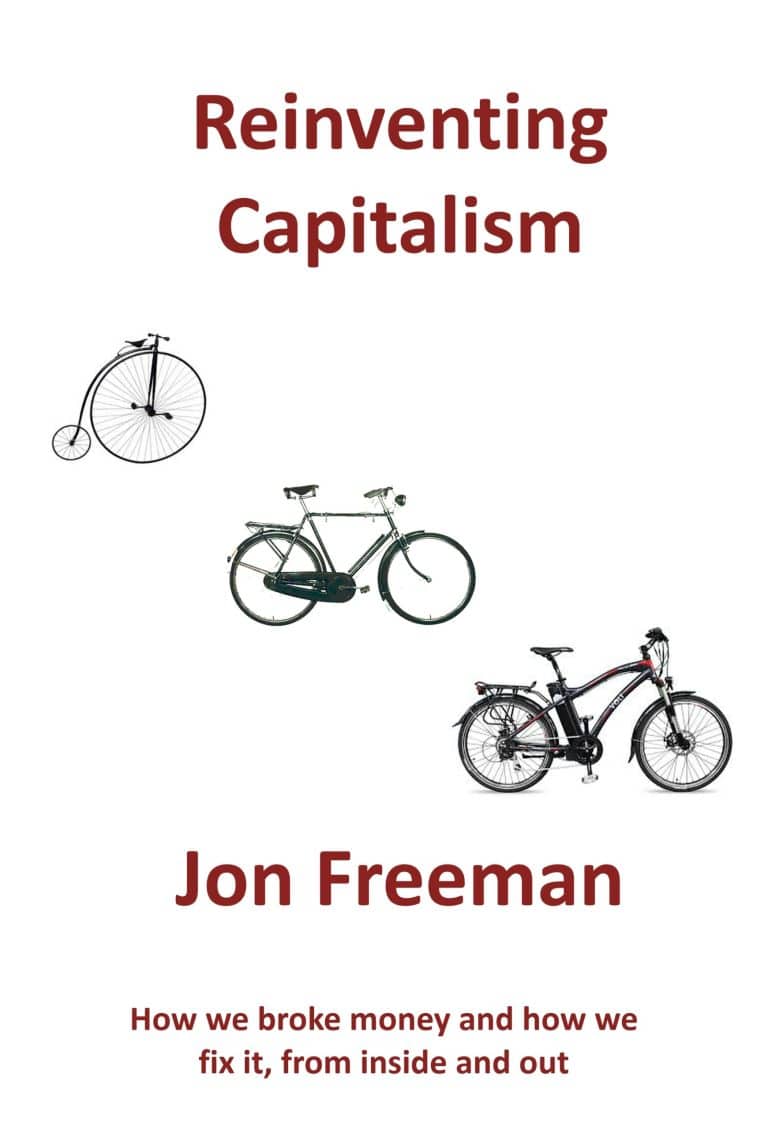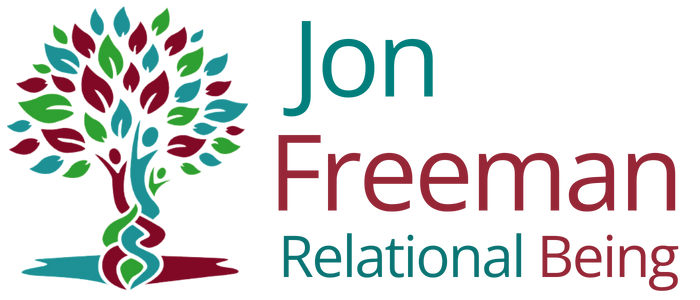

I have written 36 such proposals - listed lower down in detail on this page

We treat money as real in ways which it is not, and our emotional relationships with it are often
unconscious and unhelpful.
The world has changed since capitalism began and is now highly complex.
Our values have also changed and more change can be predicted.
Our systems for money were designed for a simpler world and less evolved values and must
adapt to facilitate the future that is emerging.
The misunderstanding about what is “real” has led the world to replace capitalism with debtism and to confuse
growth in money with growth in goods, services or relationships. The result has been chronic instability and
a crash which is liable to be repeated.
Making money and growth more important than everything else has distorted the way that we govern corporations
and the way that we make decisions.
We are failing to balance the needs of those who supply
money, intellectual capital, physical effort and goods & services or
the external requirements of regulators, taxation systems, planetary resources, climate and ecology,
local communities and societal health.
We have failed to grasp how money behaves over time, how flow and circulation are as significant as quantity leading to poor decisions, personally and societally.
We are torn between money-
We apply simplistic and linear decision-
We need a system that is responsive, self-
and fairness at every level.
We need changes in all four areas. Our beliefs and our systems must evolve in tandem, and rapidly. The ways that we thought about money formed the structures and operating models of our businesses, organisations and economic systems. The structures and operating models guide our behaviours and constrain what we believe is possible.
The book makes 36 proposals for a higher perspective from which both our thinking and our systems can evolve together into something new. It offers a basis for a further collaboration between those people who are pioneering aspects of the new thinking in order to design the next stage of human social economics and to replace the current fear of change with pragmatic vision, hope and optimism.
These 36 proposals form Chapter 15 of the book.
You may download a pdf copy of the chapter in its original format here
The proposals are not copyrighted and are intended to become part of a creative commons.
They are also not sacred and are expected to change.
1
Please acknowledge the origin of the proposals and link them back to the book or this site. Thank you.
2
Please reproduce / distribute them in their original form.
If you wish to propose changes or have comments to make please keep these distinct from the original.
3
Please be aware that the proposals have a rationale behind them that stems from
the analyses and explanations in the book itself.
Disagreement is free and inevitable.
However please give them the respect that is due: refrain from making critiques, writing to the author
or proposing amendments and additions without first
discovering the reasons behind them, and the way that they connect together.
That said, I hope that you will be inspired by the vision that they represent, and motivated to lend your support
– in whatever form your passion expresses itself in.
1. Money must mean something.
Our thinking must support a close connection between the money we use and the physical realities that it
ascribes monetary value to.
2. Money cannot be created out of nothing.
We must purge ourselves of any ideas which encourage any belief that money can be created out of nothing or
that it can grow by itself, without other creative action
3. Be grounded in the present.
We need a way of being that helps us to live in the present.
Where we borrow from our personal or collective future we are assisted to stay grounded and discouraged from
over-reaching. We look for “paying it forward” approaches in real terms and find modern equivalents of the Amish community barn-raising day. Where we look to the future, we look at how to build for that in the present.
4. Eliminate the throwaway mentality.
We cannot live successfully in the belief that everything in our world is somehow dispensable.
5. Build our awareness of interdependence.
Our thinking and Values must increasingly recognise the global and local interdependence of all human beings.
It must then extend to a recognition of our dependence on ecosystems and
of the impact that human decisions have on them.
6. Allow reward for creativity and inspiration.
We can and should encourage individuals and groups to excel, to be creative and to receive abundantly
from the fruits of their inspiration, their hard work, their investment in research, their dedication
in building businesses and their willingness to take risks. Fairness cannot be achieved and
is not to be achieved by suppressing the individual spirit
7. Support the flow of wealth.
We must encourage and incentivise those who are creating personal surplus so as to discourage hoarding,
support the free flow of money, propel investment in each other; that we value giving and foster relationship.
8. Balancing stakeholder needs.
This is fundamental to Conscious Capitalism and its many similars. We require corporate cultures that are capable
of meeting the needs of all stakeholders in a balanced way, where shareholder profit exists alongside customer service, supplier relationship, employee well-being, ension funding, social responsibility, regulatory compliance,
local and planetary sustainability. It requires us to place value on trust and happiness in the same way that we do
for brand loyalty, and to recognise the negative value of ecological damage.
9. Gifting and Receiving.
We must improve our awareness and understanding of what these mean, how they contribute
to each other and how we live in balance
10. Freedom and Responsibility.
We must improve our education, awareness and understanding of the necessary balance in these internal dynamics.
11. Collaboration and Competition.
We must re-educate and improve awareness of the falsehoods erected around Darwinism and
increase the recognition that evolution and ecology are a dynamic balance
of competitive and mutually supportive linkages.
12. Money must mean something.
Our systems must support a close connection between the money we use and the physical realities
that it ascribes monetary value to.
13. Money cannot be created out of nothing.
Our systems must discourage activity based on the belief that money can be created out of nothing
or that it can grow by itself, without other creative action.
This includes reversing of the policy by which banks are now in effect
printing money through the issue of unrestricted debt.
14. Short-termism is destructive.
Our systems must encourage long-term investment and discourage short-term speculative manipulation
(this to include further evaluation of the “Tobin tax” or similar mechanisms).
The balance of stock-market behaviour needs to favour investment over trading and
to make it difficult for investment managers to profit from unnecessary “churn” of client funds.
15. Inhibit currency speculation.
The buying and selling of currencies should be directly connected with the functional use of the money
and currency speculation and manipulation should be strongly inhibited.
16. Align compensation with long-term performance.
Our thinking and Values must increasingly recognise the global and local interdependence of all human beings.
It must then extend to a recognition of our dependence on ecosystems and
of the impact that human decisions have on them.
17. A level playing field.
We need increasingly to recognise the life conditions of different peoples, cultures and regions,
assist them to manage their own development and avoid exploitation arising from the differences
between our conditions and theirs
18. Balancing stakeholder needs
We must create supportive legal, governance and financial frameworks to enable corporate cultures to
more easily meet the needs of all stakeholders in a balanced way. (See no. 8 above).
19. Simultaneous Policy and global co-ordination.
Find ways to co-ordinate global policy-making which are effective in countering national self-interest, recognise interdependency and which better balance the collaborative and competitive aspects of economic behaviour.
20. Costs and benefits are not all material.
We must improve our awareness and understanding of what these mean, how they contribute
to each other and how we live in balance.
21. Living systems have Value.
We must extend our ability to ascribe monetary value in a way that encompasses living systems
– that it is assumed that every species and ecosystem has financial worth even where we have not yet
discovered it or measured it in human terms
22. The environment has Value.
We must improve our systems for recognising the financial cost of environmental impact,
extending beyond toxicity, atmospheric and habitat damage
to include the sensed aspect of contribution to our quality of life and that of future generations
23. True Cost Accounting.
We must not continue to externalise costs to be left unpaid or picked up at random by others and by society.
Our financial thinking about the cost of goods must recognise fully not only the cost of manufacture, but the cost of packaging, package disposal, recycling, the economics of repair and non-repair.
We must account for cost of final disposal where we fail in those others.
24. Full Cost raw materials recognition.
Enhance our financial thinking and systems to recognise the true cost of raw materials
– the environmental costs of obtaining them, the impact on inhabitants of source regions,
the cost of proper management of toxic wastes from refining them and the subsequent recovery of exploited areas.
25. Planetary stewardship.
Develop systems which ensure and enforce that ownership of, control over or material benefit from
any natural planetary resource is closely coupled with its stewardship;
recognising that none of us own the Earth or its riches, that we are at best co-tenants and joint beneficiaries.
26. True National Benefit assessment.
We need to replace monetary measures of national success (such as GDP) with measurement that also assesses
physical health, social, cultural and spiritual well-being, community strength and cohesion, habitat quality,
human longevity and systemic sustainability.
27. True National Cost recognition.
We require the ability to distinguish economically between activities which are productive
(such as agriculture and manufacture) and activities which however essential
represent human costs such courts, prisons, hospitals, social care, waste management and insurance claims.
We must measure both Gross Domestic Product and Gross Domestic “Cost”.
28. Improve our thinking around inflation and growth.
We must reduce systems and activities which embed monetary inflation as an inevitable feature
of economic life and assume that our children and grandchildren will pick up the bill.
This requires us to learn to distinguish natural and systemic planetary growth from the growth of money supply.
29. Corporate stewardship.
Treat shareholders as suppliers of capital rather than as owners of the enterprise and require that their attitude to the corporation is one of long-term stewardship.
30. Corporate legal responsibility.
Corporations are not persons. They must not be treated legally as if they have equivalent rights to individual humans.
31. Preventive thinking.
We require increased ability to distinguish and assign value to costs incurred (investments in quality)
which inhibit later costs; for example between health systems to treat sickness and health systems
to maintain wellness.
It may not serve society to have prisons that run for profit, where companies benefit from higher crime figures. How do we create a peace industry to balance the armaments one? For the sake of our children we must require governments to enumerate and be accountable for consequences beyond their term of office.
32. Governmental long-term responsibilities.
For the sake of ourselves and our children we must require governments to enumerate and be accountable for
consequences of their decisions beyond their term of office.
33. Recognising societal benefit.
We need to move away from the simple division between “for profit” and “not-for-profit” activities, reducing the discrepancies in value assigned between those who work for the benefit of others and those
who work to gain benefit from others. We must reduce the devaluation of the former and the change the way
that teachers, nurses and social carers are viewed only as a cost to society.
34. Balance Freedom and Responsibility
Improve our societal capacity to tell the difference between the inalienable value of individual freedom and
the right to be socially, environmentally or even self-destructive.
35. Socially responsible valuing of risk.
Create systems which direct the human impulse to gamble and to play with risk towards
productive outcomes and away from destructive ones.
36. Right-scale Distributed Democracy.
We need to improve the balance between centralised and locally accountable decision-making, which in most Western countries is over-centralised. This will increase relevance of decisions, productive economy, closer attention to cost management and increased engagement with the democratic process.
You may download a pdf copy of the full chapter in its original format here

It is well-known that many shamanistic cultures experience direct connections with the spirits of plants and animals. Assuming that you don’t regard that as illusion or projection, you might ask - what is that for us and for today’s world?
There are “modern shamans” – people who work with that realm of connection. In fact there are many – horse whisperers, plant spirit medicine practitioners for example. There are well-known examples of people who garden in collaboration with nature, and books such as Dorothy Maclean’s “To hear the Angels Sing”, which describes how enormous vegetables were produced in the seemingly barren soils of Findhorn. Machaelle Small Wright has given in-depth accounts of how she created the Perelandra garden.
There are also stories of animals – particularly horses - being used in healing. There is a great story of one such in my Substack “A tale of a psychic horse”. I also talk about nature spirits in the “What’s Nature to you” chapter of “What makes you YOU” and the chapter on shamanism in “The Science of Possibility”.
It is an inevitable outcome of the “information field” as a central theoretical theme in both books, that our ability to connect with what animates other parts of the living world will reveal itself in many ways.”
Read this substack article: The Tale of the Psycic Horse